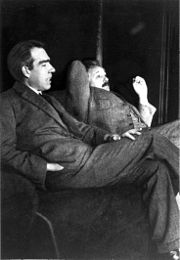
I saw an odd question on Quora recently. I suspect it was asked by someone with a weak command of English language idioms, and I answered it accordingly.
But it leads to thought about a fascinating incident in the history of physics, the Bohr-Einstein correspondence over quantum physics.
The question was as follows:
What's the meaning of "only to have Bohr" here? "Einstein would come up with a scenario in an attempt to defeat the quantum theory, only to have Bohr present an argument consistent with quantum theory that overcame it"?
I answered as follows.
If the idiom is unfamiliar to you, it is because of the conditional wording of the sentence. “A would do X, only to have B do Y.”
One could rework it this way, “Einstein repeatedly came up with scenarios in an attempt to defeat the quantum theory, and in each case Bohr presented an argument consistent with quantum theory that overcame it.”
It was Bohr, by the way, who got the publication credit our of the correspondence. He published an article in 1949 entitled "Discussions with Einstein on Epistemological Problems in Atomic Physics".
Einstein proposed various ingenious thought-experiments, involving idealized apparatuses, essentially daring Bohr to show why they could NOT eliminate the uncertainty. Bohr successfully did so, and Einstein remained frustrated.
The debate prefigured the continuing puzzle of 21st century physics and cosmology. There will be no Grand Unified Field Theory until gravity can be described in terms consistent with the descriptions of the strong atomic force, and weak atomic force, and electromagnetism. Those other three fields are now understood in the quantum terms pioneered by Bohr. But gravity? it is the realm of the theory of gravity as expounded by you-know-who. And efforts to produce a "quantum gravity" have thus far produced mostly confusion.
So both men are passed on long since, but their correspondence lives.
Comments
Post a Comment